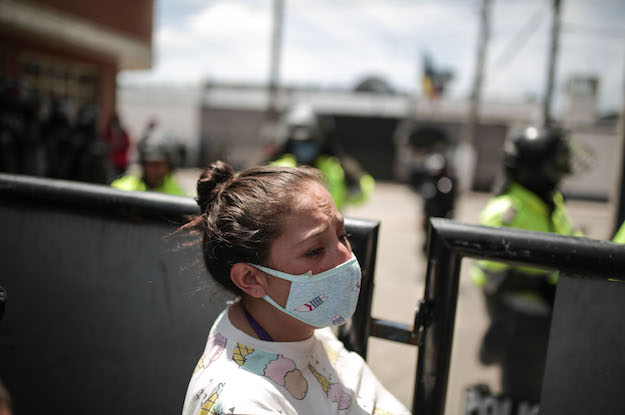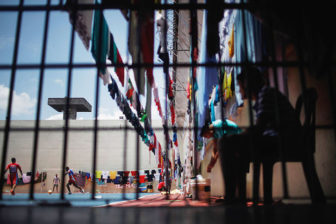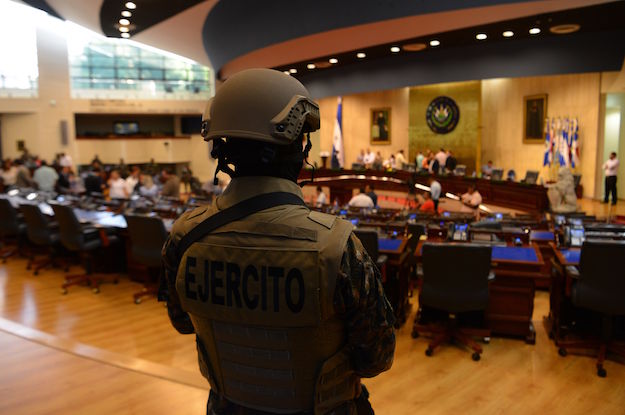This article is adapted from AQ’s special report on Latin America’s armed forces. | Leer en español
The story of how the journalist Mauricio Weibel unveiled systemic corruption inside the Chilean armed forces in 2015 is filled with stunning turns. First, Weibel offered the investigation to big media outlets, but was repeatedly turned down. It was the satirical newspaper The Clinic that decided to publish it. Only when the scoop ignited a political firestorm in Santiago did the mainstream media turn its attention to Weibel’s revelations.
Dubbed Milicogate, the scandal involved a kickback scheme using funds from state-owned copper production earmarked for the armed forces. Weibel recounted how army staff used fake invoices to launder several million dollars over a period of at least six years. Money for weapons and contractors was allegedly diverted to luxurious trips, horses, casino nights and soldiers’ pockets. Two internal investigations into the scheme were quashed and remained secret — until sources began collaborating with the journalist.
“Chileans knew about isolated cases of corruption in the military, but nothing so concrete and widespread. With Milicogate, we had all the evidence to demonstrate what was going on,” Weibel told AQ.
The ensuing judicial investigation implicated over 40 officers, including the army commander from 2010 to 2014, General Juan Miguel Fuente-Alba, accused of amassing a fortune incompatible with his salary. At press time, Fuente-Alba was under house arrest and his successor, General Humberto Oviedo, in jail accused of obstructing justice. The former head of army finance, general Jozo Santic, was sentenced to 13 years in prison.
Yet the bleeding did not stop. Other embarrassing stories continued to emerge, including with overpriced airline tickets and fraudulent public tenders.
In August 2019, a newspaper revealed that the military intelligence had launched “Operation Topographer” to surveil Weibel and identify his sources.
“I imagined that they were watching me, but nothing like this,” he said. “Corruption became a matter of national security not because people were stealing, but because I was investigating.”
Several factors created an environment ripe for corruption in the Chilean armed forces. Soldiers were managing colossal budgets with little oversight. Opaqueness and a strict vertical bureaucracy fostered a culture of impunity. Military and civil justice had confusing and overlapping attributions. The national security argument was used to protect private interests.
From a regional perspective, these elements are not unique to Chile, one of the least corrupt countries in Latin America. In fact, they are present in almost all militaries in the region. The difference is that in Chile, Milicogate reached levels of caricature — with horses and casinos — while information was available to the public and some institutions were strong enough to enforce the law.
Still, Latin America has witnessed several corruption scandals in the military over the past few years — from embarrassing graft and spying accusations involving Colombia’s armed forces general command to more than 300 fraud and bribery cases allegedly hidden by Brazil’s Military Chief Prosecutor Office. Most likely we are only seeing the tip of the iceberg.
A dangerous notion
Like in all areas of government in the region, corruption is a critical challenge for the armed forces. The notion that civilian areas of government are more corrupt than the military throughout Latin America is not supported by the available evidence. In some places where the state is more fragile, the armed forces are one of the strongest government institutions, which could potentially make them less permeable to corruption. But even if that is true, the critical variable is not “military” or “civilian,” but institutional strength. Moreover, some characteristics of the military universe — like its strict hierarchy, esprit de corps and separate justice system — may actually increase the incentives for corruption.
And yet, the myth that soldiers are inherently less corrupt than civilians endures in most corners of Latin America. Besides being demonstrably false, this notion has dangerous implications for the rule of law and democracy.
The most evident threat is that the armed forces can be viewed as a credible alternative to “clean up” the country when corruption engulfs the political class. According to a recent poll from the Latin American Public Opinion Project (LAPOP), tolerance of a military coup “under high corruption” remains surprisingly high, although the numbers vary across the region. In Peru, 57% responded that a military takeover could be justifiable in extreme cases of corruption. In Uruguay, the number was 23%.
Unsurprisingly, generations that did live through military dictatorships tend to be significantly less tolerant of the idea of generals taking over to “fix” corruption. Also, the public’s sentiment seems driven by factors external to the armed forces — namely, the economy and major corruption scandals. From 2008 to 2014, when Latin American economies were booming under high commodity prices, tolerance of a potential military coup under conditions of high corruption dropped by more than 17 percentage points. The trend reversed amid the following economic downturn, combined with high profile scandals — Lava Jato, Odebrecht, Mexico’s series of cases under President Enrique Peña Nieto, and others.
A conventional coup followed by military rule seems unlikely in the region (at least for now). But the myth of the non-corrupt military can also contribute to the gradual deterioration of democracy. For one thing, this perception — particularly during a period of high anti-establishment sentiment — increases the incentives for expanding the military’s role outside the realm of defense or even security. In many ways, this is the story of Brazil after Lava Jato, where the collapse of the political class created a void partially filled by the military, now involved in policy areas ranging from education to energy.
Also, the enduring myth tends to block changes that could reduce and prevent corruption in the military. Potential reforms might include more civilian oversight (including through congress) of the military, stronger internal controls and whistleblower mechanisms, taking advantage of technology to increase transparency and efficiency of military procurement systems, making sure that military justice works for the benefit of the country — not just a group within the forces — and more.
These improvements need leadership from the top, and favorable political conditions, in order to be approved. One senior member of the Michelle Bachelet administration, in office when Milicogate broke, says reforming the military was politically unfeasible for a leftist president who had been exiled by the dictatorship, as Bachelet was. “The right needs to do it — it’s our version of Nixon going to China,” this person said. Bachelet’s successor, the center-right president Sebastián Piñera, also did not seriously address the issue. Following the protests of late 2019, reforming the military under a new constitution became a real possibility. But again, a lot will depend on political leadership and on the durability of the non-corrupt military myth—Will it finally disappear?









